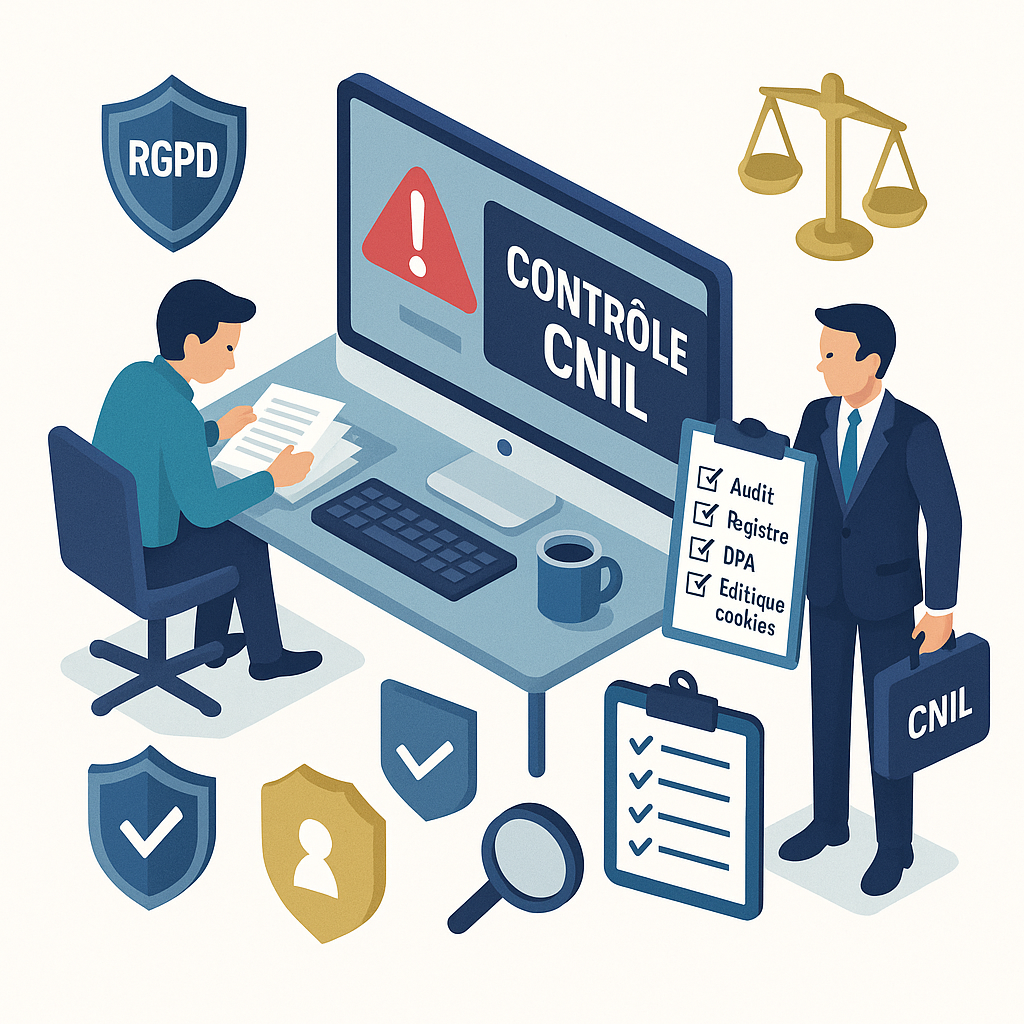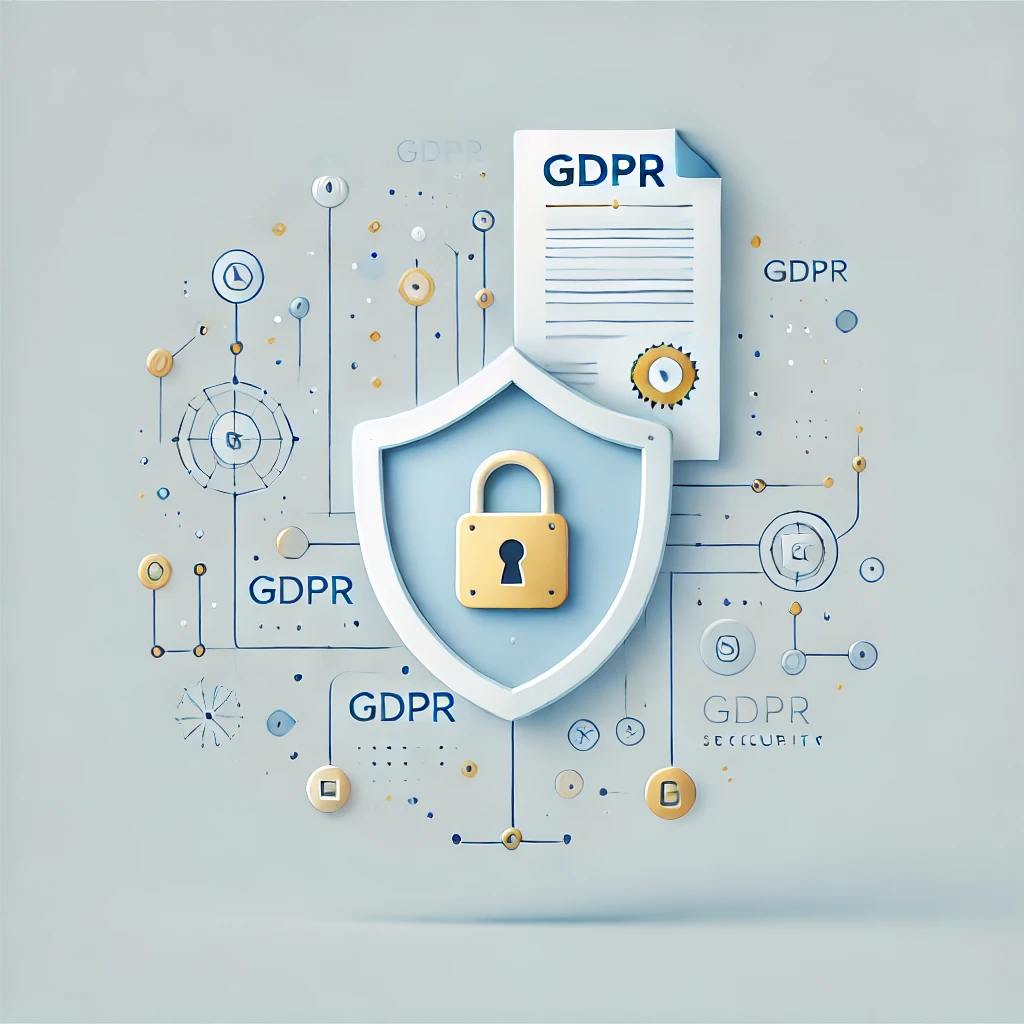The CNIL is stepping up its inspections: understanding the mechanisms of a CNIL inspection and preparing for it with the help of a lawyer is essential.
The Commission Nationale de l'Informatique et des Libertés (CNIL ) is stepping up its inspections of organizations of all sizes. In 2024, it significantly increased the number of inspections, with a particular focus on sectors handling sensitive data.
In the face of this heightened vigilance, understanding the mechanisms of a CNIL inspection and preparing adequately for it becomes essential for any structure handling personal data.
If you need a CNIL lawyer, contact me!
The different types of CNIL inspection and how they are carried out
The CNIL has several ways of intervening, each with its own specific features. It's crucial to be aware of them, so as to anticipate these potentially destabilizing situations as effectively as possible.
On-site inspection
On-site inspections are the most dreaded form of intervention. CNIL agents arrive on your premises, usually without prior notice, armed with a letter of mission. Their investigation may last several hours or even days, depending on the complexity of your information system.
During this inspection, agents are empowered to :
- Access to all business premises
- Request all documents necessary for their mission
- Gather statements from any person likely to provide information
- Copy documents or data to any medium
- Access to computer programs and data
L’assistance juridique comme rempart stratégique : Dans ce contexte d’inspection approfondie, un avocat CNIL joue un rôle déterminant. Il peut être présent lors du contrôle pour veiller au respect de vos droits, conseiller vos équipes sur les informations à communiquer et s’assurer que les agents n’outrepassent pas leurs prérogatives. Sa présence évite souvent les erreurs de communication qui pourraient aggraver votre situation.
Online control
Online control enables CNIL agents to remotely assess the compliance of your digital services (websites, mobile applications, connected objects). Without even contacting you, they can check :
- Compliance with information obligations
- How to obtain consent
- The presence of non-essential cookies deposited without consent
- Interface security (including penetration testing)
- Accessibility of forms for exercising rights
Une expertise technique et juridique combinée : Pour anticiper ce type de contrôle, l’intervention préventive d’un avocat spécialisé s’avère précieuse. Il travaille en collaboration avec vos équipes techniques pour réaliser des audits de vos interfaces numériques et identifier les non-conformités avant qu’elles ne soient détectées par la CNIL. Son expertise vous permet d’implémenter des solutions conformes tout en préservant l’expérience utilisateur.
Documentary inspection
A documentary inspection begins with a letter asking you to provide specific documents within a short timeframe (often two weeks). Although less intrusive in appearance, this procedure is nonetheless formidable, as it precisely targets the points that the CNIL wishes to examine.
Frequently requested documents include :
- Data processing register
- Impact analyses carried out
- Data breach management procedures
- Contracts with subcontractors
- Proof of consent
- Data retention policies
Un accompagnement décisif pour votre réponse : Face à cette demande documentaire, l’intervention d’un avocat CNIL transforme une contrainte en opportunité. Il analyse les documents que vous possédez, identifie les lacunes et vous aide à préparer une réponse structurée qui valorise vos bonnes pratiques tout en minimisant l’impact des éventuelles faiblesses. Sa maîtrise du langage juridique et sa connaissance des attentes de la CNIL constituent des atouts majeurs dans cette étape critique.
Critical points examined during a CNIL inspection
Regardless of the type of inspection, CNIL staff always pay particular attention to certain aspects.
Lawfulness of processing and compliance with fundamental principles
The CNIL's priority is to check that your personal data processing has a valid legal basis and complies with the fundamental principles of the RGPD :
- Purpose principle: data are collected for specific, explicit and legitimate purposes.
- Minimization principle: only strictly necessary data is collected
- Principle of accuracy: data is accurate and, if necessary, updated
- Principle of limited retention: data are retained only as long as necessary.
- Principle of integrity and confidentiality: data is appropriately protected
L’approche structurée d’un conseil juridique : Un avocat spécialisé dans les problématiques CNIL apporte une méthodologie éprouvée pour examiner vos traitements selon ces critères fondamentaux. Il identifie les zones de fragilité potentielles et vous propose des mesures correctives proportionnées, tenant compte des spécificités de votre activité et de vos contraintes opérationnelles.
Data security and incident management
Personal data security measures are subject to in-depth scrutiny. The CNIL will assess your technical and organizational measures:
- Access and authorization management policy
- Encryption of sensitive data
- Traceability of system actions
- Regular backups
- Data breach management procedures
- Employee training and awareness
A strategic and operational vision: In this technical field, where the legal stakes are high, the added value of a CNIL lawyer lawyer's added value lies in his ability to translate legal requirements into concrete measures adapted to your context. He can help you document your choices and justify the proportionality of your security measures in relation to the risks identified.
Respecting the rights of those concerned
The ease with which people can exercise their rights (access, rectification, deletion, opposition, portability) is systematically assessed during an inspection:
- Accessible means of exercising rights
- Response times
- Quality and completeness of responses
- Traceability of requests and responses
- Verification of applicant's identity
The advantage of targeted legal expertise: A specialist lawyer helps you to set up effective procedures for managing requests to exercise rights. He or she trains your teams to recognize these requests, even when they are made informally, and to respond appropriately. His intervention helps avoid misinterpretations that could lead to unjustified refusals or incomplete responses.
The company's rights and duties during a CNIL inspection
When faced with a CNIL inspection, it's essential to know both your obligations and your rights, in order to adopt a cooperative yet vigilant stance.
Your obligations during the inspection
During an inspection, you are required to :
- Cooperating with CNIL staff
- Provide access to business premises during opening hours
- Provide them with the requested documents and information
- Answer their questions honestly
Obstructing inspectors is a criminal offence punishable by up to one year's imprisonment and a €15,000 fine for individuals, and €75,000 for corporate bodies.
La médiation juridique comme garantie : Dans ces moments de tension potentielle, la présence d’un avocat CNIL se révèle particulièrement précieuse. Il sert d’interface entre vos équipes et les contrôleurs, veillant à ce que l’obligation de coopération soit respectée tout en protégeant les intérêts légitimes de votre organisation. Son expertise lui permet d’identifier les demandes qui excèderaient le périmètre légal du contrôle.
Your rights during the inspection
In addition to your obligations, you have certain rights that you should be aware of and exercise:
- Right to be assisted by counsel (lawyer) throughout the inspection period
- Right to demand production of agents' engagement letters and business cards
- Right to make observations and have them recorded in the minutes
- The right not to incriminate oneself (a fundamental principle of law)
- The right to confidentiality of correspondence with your lawyer
La protection juridique en action : Un avocat spécialisé en droit des données maîtrise parfaitement ces subtilités procédurales et veille au respect scrupuleux de vos droits. Sa présence dissuade souvent les contrôleurs de formuler des demandes excessives et garantit que le contrôle reste dans les limites de ce que la loi autorise.
Post-inspection: anticipating possible consequences
Once the inspection is complete, a number of scenarios can arise, with very different consequences for your organization.
No further action
In the best-case scenario, if no significant shortcomings have been identified, the CNIL may decide to close the case with no further action. However, this favorable outcome is still quite rare, as most inspections identify at least a few points for improvement.
Formal notice
If non-compliance has been identified, the CNIL may issue a formal notice requiring you to comply within a specified timeframe (generally 1-3 months). This decision may be made public, with a potential impact on your reputation.
L’accompagnement correctif d’un expert : Face à une mise en demeure, l’intervention d’un avocat CNIL devient cruciale. Il analyse les griefs formulés, évalue leur bien-fondé juridique et vous accompagne dans l’élaboration d’un plan d’action priorisé. Son expertise vous permet d’apporter une réponse complète et documentée dans les délais impartis, maximisant vos chances d’éviter des sanctions plus sévères.
Penalties
In the event of serious or persistent breaches, the CNIL may impose administrative sanctions, which may take various forms:
- Administrative fine of up to €20 million or 4% of worldwide annual sales
- Injunction to cease treatment
- Temporary or permanent restriction of treatment
- Data flow suspension
- Publication of the penalty, adding reputational damage to the financial loss
Strategic defense as a necessity: In this critical phase, representation by a specialized lawyer is a must. He or she can prepare your defense before the CNIL's restricted committee, challenge the questionable elements of the investigation report and highlight the corrective measures already implemented. His intervention can lead to a significant reduction in the sanctions envisaged, or even to their abandonment.
Why a CNIL lawyer is essential
Faced with the complexity and challenges of a CNIL inspection, the support of a specialist lawyer represents a strategic investment to protect your organization.
Before the inspection: prevention and preparation
Anticipation is your best protection. A CNIL lawyer can help you :
- Conduct preventive compliance audits
- Implement complete and up-to-date documentation
- Train your teams to manage an inspection
- Prepare a "control kit" containing essential documents
- Draw up an internal procedure defining everyone's role in the event of an inspection
During the inspection: support and mediation
During the inspection, your lawyer plays a decisive role in :
- Representing you to controllers
- Guaranteeing your rights
- Guide your employees' responses
- Check the regularity of control operations
- Formulate relevant observations to be recorded in the minutes
After the test: defense and remediation
At the end of the inspection, he will help you to :
- Analyze the inspection report and conclusions
- Dispute disputed points within the allotted timeframe
- Draw up a priority compliance plan
- Preparing your defense in the event of sanction proceedings
- Negotiate possible commitments with the CNIL
Conclusion: turning control into opportunity
A CNIL inspection, although a legitimate source of apprehension, can be transformed into an opportunity to improve your data protection practices. With the support of a specialist lawyer, this experience becomes an opportunity to strengthen your compliance and consolidate the confidence of your stakeholders.
Our law firm specializing in CNIL compliance offers you customized support at every stage of the inspection process. Whether you wish to anticipate a possible inspection through a preventive audit, be assisted during an ongoing inspection, or defend your interests following an unfavorable report, our experts put their legal and technical expertise at your service to transform this regulatory constraint into a competitive advantage.




